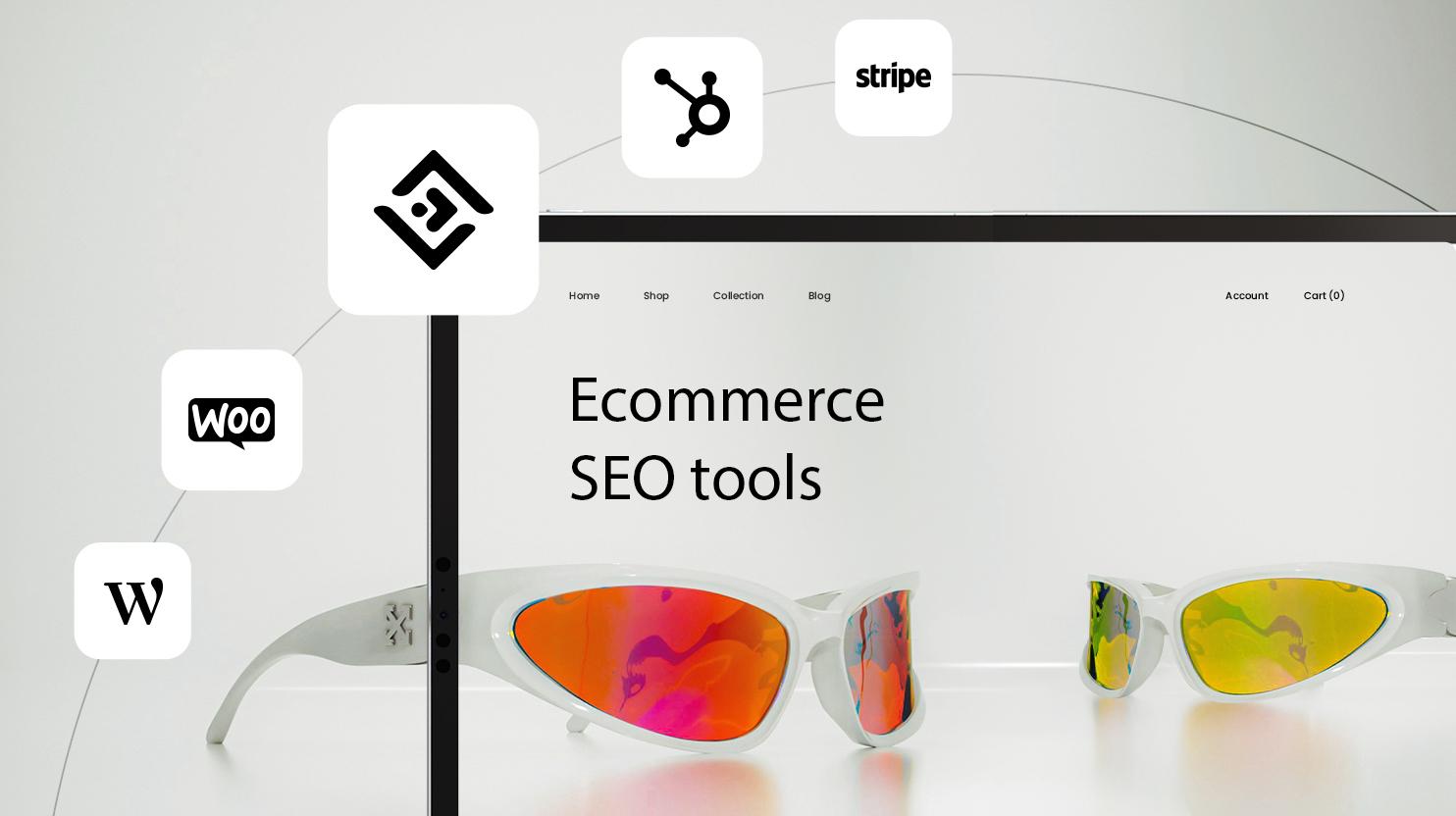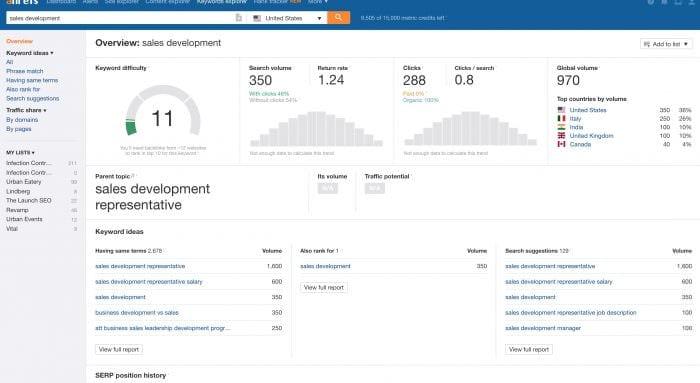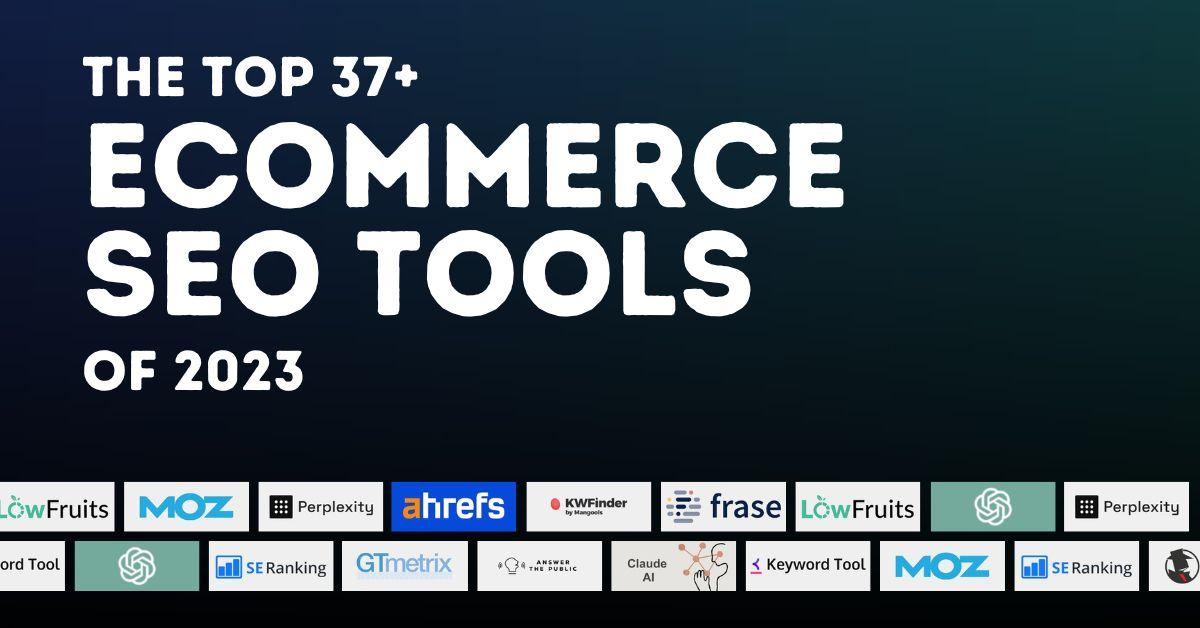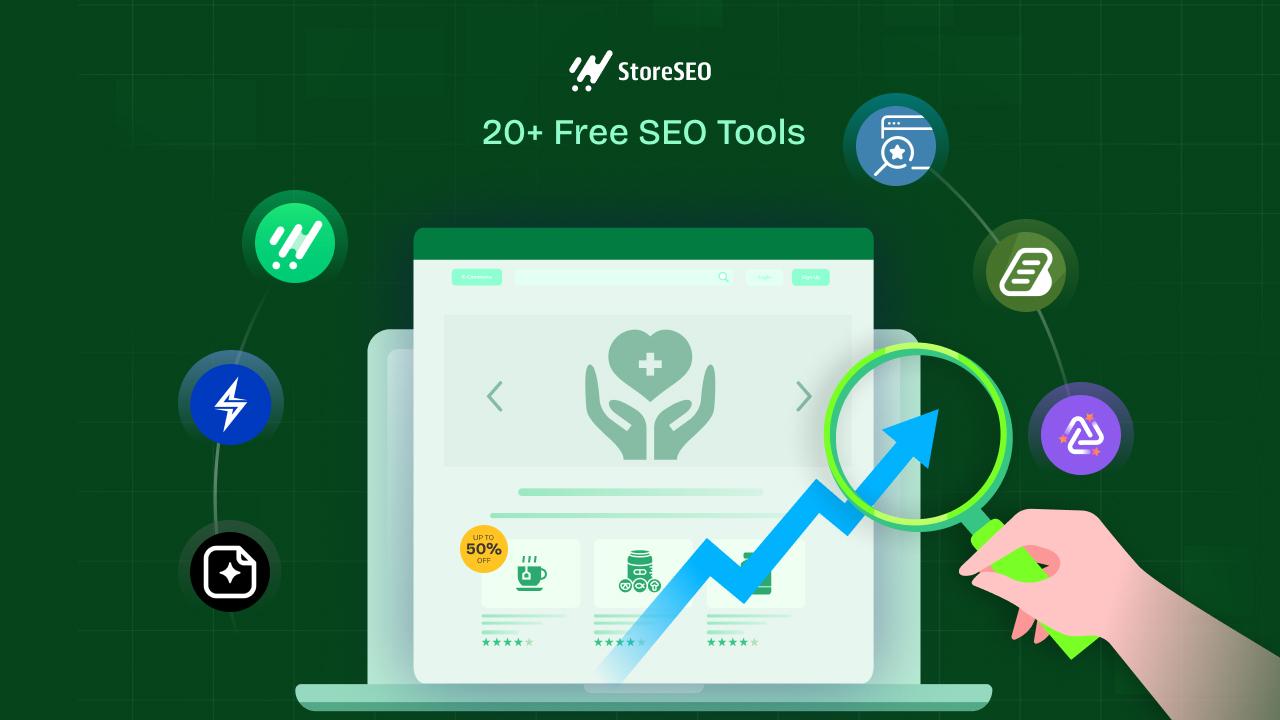Are you ready to take your online store to new heights? If you’re like most eCommerce entrepreneurs, you’ve probably put a lot of time and effort into curating the perfect products and designing an eye-catching website. But here’s the deal: without the right visibility, all that hard work can easily go unnoticed. That’s where SEO comes into play! Search Engine Optimization is the magic wand that can help your store stand out in a crowded marketplace. In this article, we’ll explore the 12 best eCommerce SEO tools that can help elevate your rankings, drive more traffic to your site, and ultimately boost your sales. Whether you’re a seasoned seller or just starting out, these tools will empower you to optimize your online presence like a pro. Let’s dive in and transform your store into a search engine favorite!
Understanding the Importance of SEO for Your Ecommerce Business
In the ever-evolving landscape of ecommerce, where competition is just a click away, understanding the nuances of search engine optimization (SEO) is crucial for your online store’s success. By optimizing your website for search engines, you not only enhance visibility but also attract potential customers who are actively searching for products that you offer. This is where the role of SEO tools comes into play.
When you harness the power of SEO tools, you gain insights that can transform your business strategy. These tools help you:
- Identify Keywords: Discover the phrases your target audience is using to find products similar to yours.
- Analyze Competitors: Understand what your competitors are doing right and learn from their successes and mistakes.
- Track Performance: Monitor your website’s rankings and traffic to see what’s working and what needs improvement.
- Optimize Content: Get recommendations on how to enhance product descriptions, blogs, and other content to make them more compelling and search-friendly.
Furthermore, leveraging these tools can lead to a significant increase in organic traffic, which is often more cost-effective than paid advertising. With the right strategies in place, your ecommerce business can achieve higher rankings on search engine results pages (SERPs), driving more visitors to your site and ultimately increasing sales.
To illustrate the impact of effective SEO practices, consider the following table that outlines the potential benefits of optimizing your ecommerce site:
| Benefit | Impact |
|---|---|
| Increased Visibility | Higher rankings lead to more clicks. |
| Better User Experience | Well-structured sites keep customers engaged. |
| Higher Conversion Rates | Targeted traffic is more likely to purchase. |
| Long-Term Results | SEO investments yield sustainable growth. |
Investing in robust SEO practices is not just an option; it’s a necessity for any ecommerce business looking to thrive. By continuously refining your SEO strategy and utilizing the best tools available, you’ll position your online store for success in a crowded market. The right approach can lead to a loyal customer base and a flourishing business.

Key Features to Look for in Ecommerce SEO Tools
Choosing the right ecommerce SEO tool can significantly impact your online store’s visibility and overall success. Here are some key features that should be on your checklist when evaluating these tools:
- Keyword Research: A robust tool should provide comprehensive keyword analysis, including search volume, competition, and trends. Look for features that help you discover long-tail keywords that your competitors might be missing.
- On-Page Optimization: Effective SEO tools should offer on-page optimization suggestions, helping you improve your product pages, category pages, and overall site structure. This includes guidance on meta tags, headings, and content optimization.
- Technical SEO Audits: A great tool will provide regular audits that identify technical issues like broken links, slow page speed, and mobile usability. These audits are essential for maintaining a healthy site that ranks well in search engines.
Another essential feature is the ability to track your rankings over time. A good ecommerce SEO tool should allow you to monitor how your keywords are performing, helping you adjust your strategy as needed. It’s also beneficial if the tool can track competitor rankings, giving you insight into market movements.
Integration capabilities are equally important. Look for tools that seamlessly integrate with your ecommerce platform and other marketing tools you’re using. This can streamline your workflow and provide a more comprehensive view of your marketing efforts.
consider the user interface and customer support. A user-friendly interface can make all the difference, especially if you’re new to SEO. Additionally, responsive customer support ensures that you can get assistance whenever you encounter challenges.

Top Picks for Keyword Research Tools to Drive Traffic
When it comes to enhancing your eCommerce website’s visibility, keyword research is pivotal. The right tools not only help you discover the hottest keywords but also ensure that you’re targeting terms that will attract your ideal customers. Here’s a curated selection of standout tools that can turbocharge your keyword research efforts.
- Ahrefs – Known for its extensive database, Ahrefs offers robust keyword research features that allow you to explore search volume, keyword difficulty, and related terms. It’s a favorite among SEO professionals for uncovering high-potential keywords.
- SEMrush – This all-in-one marketing toolkit is excellent for competitive analysis. With its keyword magic tool, you can generate thousands of keyword ideas and filter them based on various metrics to find the right fit for your store.
- Ubersuggest – A user-friendly option for those starting in SEO, Ubersuggest helps you find keyword suggestions based on search data and gives insights into top-performing content that ranks for those keywords.
- Google Keyword Planner – A staple for many marketers, it allows you to discover keywords directly from Google. Though primarily for PPC, it’s invaluable for organic SEO efforts as well.
These tools not only simplify the process of finding relevant keywords but also provide insights into the competition, search intent, and trends. By leveraging these resources, you can identify the terms that your target audience is actively searching for, thereby optimizing your content strategy effectively.
Here’s a quick comparison of some features of these tools to help you choose the right fit:
| Tool | Keyword Suggestions | Search Volume Data | Difficulty Analysis |
|---|---|---|---|
| Ahrefs | Yes | Yes | Yes |
| SEMrush | Yes | Yes | Yes |
| Ubersuggest | Yes | Limited | No |
| Google Keyword Planner | No | Yes | No |
Integrating these keyword research tools into your SEO strategy is essential for driving organic traffic to your online store. By understanding the language of your audience, you can tailor your content to meet their needs, ultimately boosting your rankings and sales.

Essential On-Page SEO Tools for Perfecting Your Product Pages
To ensure your product pages stand out in the crowded eCommerce landscape, leveraging the right on-page SEO tools is crucial. These tools empower you to optimize every aspect of your product listings, from meta tags to user experience, driving organic traffic and ultimately sales.
First off, consider integrating keyword research tools. These platforms help identify high-search-volume keywords relevant to your products, allowing you to craft compelling titles and descriptions. Some popular options include:
- Ahrefs – Great for in-depth keyword analysis
- SEMrush – Helps uncover competitor keywords
- Ubersuggest – A user-friendly tool for beginners
Next, focus on optimizing your product descriptions and images. Utilizing tools like Yoast SEO or Rank Math can guide you in writing SEO-friendly content, ensuring that your descriptions are not only engaging but also packed with the right keywords. Additionally, don’t overlook the importance of image optimization. Tools like ImageOptim or TinyPNG can compress images without losing quality, enhancing load times—a crucial factor for both SEO and user experience.
Another critical element of on-page SEO is structured data markup. Implementing schema markup can significantly improve how search engines understand your product pages. This not only enhances visibility but can also lead to rich snippets in search results. Tools like Schema Pro or Google’s Structured Data Markup Helper can simplify the process, allowing you to add necessary markup with ease.
| Tool | Purpose | Key Benefit |
|---|---|---|
| Ahrefs | Keyword Research | In-depth analysis of keyword difficulty |
| Yoast SEO | Content Optimization | Guides you in writing SEO-friendly text |
| Schema Pro | Structured Data | Easy implementation of schema markup |
Lastly, keep an eye on your page performance metrics. Tools like Google Analytics and Google Search Console provide valuable insights into how your product pages are performing, helping you identify areas for improvement. By continuously monitoring these metrics, you can adapt your strategies to enhance user engagement and boost your rankings. With the right combination of tools and strategies, you can transform your product pages into conversion powerhouses.
Boost Your Link Building Strategy with These Must-Have Tools
In the world of ecommerce, having a robust link-building strategy can significantly influence your site’s visibility and authority. To elevate your online store’s rankings, leveraging the right tools is essential. Here are some must-have tools that can enhance your link-building efforts:
- Ahrefs: This powerful tool not only helps you analyze your backlinks but also allows you to identify your competitors’ link-building strategies. Dive deep into the backlink profiles of top-performing competitors and discover opportunities you might be missing.
- SEMrush: SEMrush offers a comprehensive suite for SEO, including a feature dedicated to analyzing backlinks. You can track your link-building progress, find link-building prospects, and even discover toxic links that could harm your rankings.
- BuzzSumo: This tool shines in content discovery and influencer outreach. By analyzing trending content in your niche, you can find potential backlink opportunities through guest blogging or collaborations with influential bloggers.
- Majestic: With its extensive backlink history and trust metrics, Majestic is perfect for evaluating the strength and quality of potential backlinks. Its unique metrics, such as Trust Flow and Citation Flow, provide invaluable insights into link quality.
While these tools provide critical insights, implementing them effectively requires a strategic approach. Consider creating a structured outreach plan that utilizes the data gathered to engage with potential linking websites. Personalize your outreach messages to create a genuine connection, showcasing the mutual benefits of linking back to your content. Here’s a simple framework to help you organize your outreach:
| Step | Description |
|---|---|
| 1. Identify Targets | Use tools like Ahrefs or SEMrush to find relevant sites for backlink opportunities. |
| 2. Craft Your Message | Write a compelling outreach email that highlights your value proposition. |
| 3. Follow Up | Don’t hesitate to send a gentle reminder if you don’t receive a response within a week. |
Additionally, tracking your link-building progress is vital. Use Google Analytics along with the tools mentioned to monitor referral traffic from your backlinks. This data will help you understand which strategies are driving the most relevant traffic and conversions, allowing you to refine your approach over time.
By integrating these tools into your strategy, you not only enhance your link-building efforts but also contribute to the overall health and authority of your ecommerce site. The more quality backlinks you acquire, the higher your chances of ranking well in search results, ultimately leading to increased visibility and sales.
Monitoring Your SEO Performance: Tools That Make It Easy
When it comes to improving your online store’s visibility, keeping a close eye on your SEO performance is crucial. Fortunately, several tools can help you track your progress and refine your strategies. Here are some of the best options that make the process not only effective but also straightforward.
Google Analytics is a must-have for any online retailer. This free tool provides in-depth insights into your website traffic, including how users find your site and which pages are the most popular. By analyzing this data, you can identify trends and adjust your SEO tactics accordingly.
Another powerful tool is SEMrush. It offers extensive features for keyword research, site audits, and competitive analysis. With its all-in-one platform, you can monitor your rankings and discover new opportunities to enhance your SEO strategy. Plus, its user-friendly interface makes it easy to navigate even for beginners.
If you’re looking for a tool focused specifically on backlinks, Ahrefs is the way to go. It provides comprehensive backlink analysis, allowing you to see who is linking to your site and helping you understand your domain authority. With this information, you can develop strategies to improve your link-building efforts.
For a more visual approach, consider using Google Search Console. This tool offers insights into how Google views your site, including indexing status and search traffic. It also alerts you to any issues that might be affecting your performance, making it easier to rectify them before they impact your rankings.
| Tool | Main Feature | Best For |
|---|---|---|
| Google Analytics | Traffic Insights | Understanding User Behavior |
| SEMrush | Keyword Research | Competitive Analysis |
| Ahrefs | Backlink Analysis | Link Building |
| Google Search Console | Site Performance | Monitoring Indexing |
Lastly, don’t overlook Moz Pro, which offers a suite of tools for SEO tracking and optimization. From keyword research to site audits, Moz Pro helps you manage your SEO efforts effectively. Its community and resources are also invaluable for learning best practices and keeping up with the latest trends.

Local SEO Tools to Help You Reach Your Target Audience
In the ever-evolving world of eCommerce, connecting with your target audience is essential for driving sales. Local SEO tools are not just for brick-and-mortar businesses; they can significantly enhance your online store’s visibility in local searches. By leveraging these tools, you can ensure that your products reach the right customers at the right time. Here are some incredible local SEO tools to help you achieve this:
- Google My Business: Claiming and optimizing your Google My Business listing can put your online store on the map, quite literally. It helps you appear in local search results and Google Maps.
- BrightLocal: This tool provides a comprehensive suite for managing local SEO, including citation tracking, local rank tracking, and reputation management.
- Moz Local: Moz Local ensures your business listings are consistent across the web, boosting your local search visibility and helping potential customers find you faster.
Utilizing these tools can help you gather valuable insights into local search trends. For instance, Google Trends allows you to see what people are searching for in your area, helping you tailor your product offerings to meet local demand. By understanding these trends, you can create targeted marketing campaigns and promotional strategies that resonate with your local audience.
Another vital aspect of local SEO is managing online reviews. Positive reviews boost your credibility and can influence purchase decisions. Tools like ReviewTrackers and Yotpo allow you to monitor and respond to reviews effectively, enhancing your reputation and encouraging more customers to choose your store.
| Tool | Key Feature | Best For |
|---|---|---|
| Google My Business | Visibility on Google Maps | All eCommerce stores |
| BrightLocal | Citation tracking | Local businesses |
| Moz Local | Listing consistency | Multi-location stores |
| ReviewTrackers | Review monitoring | Reputation management |
Incorporating these local SEO tools into your marketing strategy can create a powerful connection between your online store and your target audience. By optimizing for local searches, you not only enhance your visibility but also foster trust and engagement with potential customers in your area.
Streamlining Your Ecommerce SEO with All-in-One Solutions
In the ever-evolving world of ecommerce, finding the right tools to enhance your SEO strategy can feel overwhelming. However, with all-in-one solutions, you can simplify your approach and achieve remarkable results. These tools not only save time but also centralize your efforts, allowing you to focus on what truly matters—growing your online store.
One of the primary benefits of using comprehensive ecommerce SEO tools is their ability to provide integrated analytics. You can track everything from keyword performance to site traffic, all in one dashboard. This enables you to:
- Monitor your rankings for targeted keywords.
- Analyze competitor performance and identify gaps.
- Optimize product listings based on real-time data.
Moreover, these solutions often come with built-in suggestions for on-page optimization. Imagine having a tool that offers insights on improving your product descriptions, or one that helps you create SEO-friendly URLs. It’s like having a dedicated SEO consultant at your fingertips! Not only does this streamline your workflow, but it also enhances the overall quality of your content.
When selecting an all-in-one ecommerce SEO tool, consider features that cater specifically to your needs. Look for options that:
- Support multiple languages for global reach.
- Include technical SEO audits to ensure your site is indexed properly.
- Offer integration with social media for cohesive marketing strategies.
A quick comparison of some popular all-in-one SEO tools reveals their unique strengths:
| Tool | Key Feature | Ideal For |
|---|---|---|
| SEMrush | Comprehensive keyword research | Large retailers |
| Ahrefs | Backlink analysis | Content marketers |
| Moz | On-page optimization | Small businesses |
| Yoast SEO | Content optimization for WordPress | WordPress users |
By consolidating your ecommerce SEO efforts into a single platform, you will not only enhance efficiency but also improve your online visibility. With the right all-in-one solution, your path to higher search rankings becomes clearer, allowing you to focus more on delivering exceptional products and experiences to your customers.

Insider Tips for Using SEO Tools Effectively
Maximizing the potential of SEO tools can drastically improve your online store’s visibility. To use them effectively, consider incorporating the following strategies into your routine:
- Set Clear Goals: Before diving into any tool, define what you want to achieve. Is it increased traffic, higher conversion rates, or improved keyword rankings? Having clear objectives will guide your tool usage and help measure success.
- Regularly Analyze Data: Consistency is key. Schedule monthly reviews of your SEO metrics to identify trends and make adjustments. Tools like Google Analytics and Ahrefs can provide valuable insights.
- Utilize Competitor Analysis: Knowing your competitors’ strategies is gold. Use tools like SEMrush to analyze their backlinks, keyword usage, and content strategies, then adapt your approach accordingly.
Moreover, understanding the features of your chosen tools can give you an edge. Here are some essential components to explore:
| Tool | Feature | Benefit |
|---|---|---|
| SEMrush | Keyword Magic Tool | Discover thousands of keywords to target for niche content. |
| Ahrefs | Site Explorer | Analyze competitors’ traffic and backlinks to improve your strategy. |
| Google Search Console | Performance Report | Track your site’s performance and visibility in search results. |
Another valuable tip is to take advantage of the integration capabilities of many SEO tools. For instance, combining Google Analytics with your SEO software can provide a deeper understanding of how organic traffic behaves on your site. This synergy allows for more tailored marketing efforts and better resource allocation.
don’t hesitate to tap into the community. Many SEO tools offer forums and support groups where you can share insights and learn from other users’ experiences. Engaging with these communities can be a treasure trove of practical tips and innovative strategies to enhance your SEO efforts.

Maximizing Your ROI: How to Choose the Right Tools for Your Store
Choosing the right tools for your ecommerce store is crucial to maximizing your return on investment. With numerous options available, it’s vital to focus on tools that not only boost your SEO but also enhance your overall store performance. Here are some essential tools that can help you climb the search engine rankings and attract more customers:
- Ahrefs: A powerful SEO tool that provides insights into your competitors’ backlinks, keyword rankings, and helps you discover new keyword opportunities.
- SEMrush: This versatile platform offers a comprehensive suite of tools for keyword research, site audits, and tracking your SEO performance against your competitors.
- Moz Pro: Known for its user-friendly interface, Moz Pro provides keyword suggestions, link tracking, and page optimization recommendations to help improve your site’s visibility.
- Google Analytics: Essential for any online store, this tool offers valuable data on your traffic sources, user behavior, and conversion metrics to refine your strategy.
- Yoast SEO: If you’re using WordPress, this plugin simplifies on-page SEO, helping you optimize your content for search engines with real-time feedback.
In addition to these tools, consider investing in content marketing platforms that can drive traffic through engaging and relevant content. Look for tools that offer:
- Content Optimization: Tools that help you analyze and improve your blog posts and product descriptions for better SEO performance.
- Social Media Management: Platforms that allow you to schedule and monitor social media posts can enhance your brand visibility and drive traffic to your store.
- Email Marketing: Services that enable targeted email campaigns can help you retain customers and bring them back to your store.
| Tool | Key Feature | Best For |
|---|---|---|
| Ahrefs | Backlink analysis | Competitor research |
| SEMrush | Keyword tracking | Comprehensive SEO |
| Moz Pro | Page optimization | Beginner-friendly SEO |
| Google Analytics | Traffic insights | Data-driven decisions |
| Yoast SEO | On-page recommendations | WordPress users |
Remember, the right combination of tools not only saves you time but also enables you to make informed decisions that can significantly impact your ROI. By selecting tools that align with your business goals and understanding how to leverage them effectively, you’ll be well on your way to creating a successful online store.
Frequently Asked Questions (FAQ)
Q&A: 12 Best Ecommerce SEO Tools to Boost Your Online Store Rankings
Q1: Why is SEO important for my online store?
A: Great question! SEO, or Search Engine Optimization, is crucial for your online store because it helps you improve your visibility in search engine results. The higher your site ranks, the more organic traffic you’ll attract. This means more potential customers discovering your products, which ultimately leads to increased sales. Think of it as the digital equivalent of a prime storefront location!
Q2: What are some key features I should look for in an ecommerce SEO tool?
A: When choosing an ecommerce SEO tool, look for features like keyword research, on-page SEO analysis, backlink tracking, and performance monitoring. You’ll want tools that can help you optimize product descriptions, generate SEO-friendly URLs, and analyze your competitors. The right tool will also provide insights into how to improve your site’s loading speed and mobile responsiveness, which are essential for user experience and rankings.
Q3: Can you recommend a few top ecommerce SEO tools?
A: Absolutely! Some of the best tools out there include:
- Ahrefs – Excellent for backlink analysis and keyword research.
- SEMrush – Comprehensive tool with features for SEO, PPC, and content marketing.
- Moz Pro – User-friendly interface with great insights into site health.
- Google Search Console – A must-have for monitoring your site’s performance.
- Yoast SEO (for WordPress) – Perfect for on-page SEO optimization.
- Screaming Frog – Great for auditing your site’s SEO aspects.
- Shopify SEO Apps – If you’re on Shopify, these can streamline your SEO efforts.
- Keyword Tool – Helps you uncover long-tail keywords that can drive traffic.
- Ubersuggest – A budget-friendly option offering keyword suggestions and SEO audits.
- BuzzSumo – Useful for content ideas and understanding social engagement.
- Rank Math – Another WordPress plugin that makes SEO approachable and effective.
- SpyFu – Excellent for competitor analysis and understanding their strategies.
Q4: How do these tools specifically help boost my online store rankings?
A: Each tool has its strengths! For instance, Ahrefs and SEMrush help you identify high-value keywords that your target audience is searching for, allowing you to tailor your content accordingly. Tools like Screaming Frog will reveal technical issues that could be hindering your SEO efforts, while Google Search Console provides valuable insights into how your store appears in search results. Together, these tools empower you to optimize your store effectively, making it more attractive to both search engines and customers.
Q5: Is there a learning curve with these tools?
A: Some tools do have a steeper learning curve than others, but many come with user-friendly interfaces and extensive tutorials. For instance, Yoast SEO is designed for beginners and offers real-time feedback as you edit your content. Don’t let the initial learning curve deter you; investing the time to understand these tools will pay off in the long run!
Q6: How long does it take to see results from SEO efforts?
A: SEO is a marathon, not a sprint! While some changes can yield quick wins, like optimizing product descriptions, it generally takes a few months to see significant improvements in rankings. Consistent effort using these tools can lead to long-term benefits, so patience is key!
Q7: Should I be using multiple tools or just one?
A: It really depends on your needs! Some ecommerce businesses find that using a combination of tools gives them the best results, as each tool can cover different aspects of SEO. For example, you might use Ahrefs for backlink analysis and Google Search Console for tracking performance. Choose what fits your budget and requirements, but don’t hesitate to experiment!
Q8: What if I don’t have time to manage SEO myself?
A: No worries! If you find SEO too time-consuming, consider hiring an SEO specialist or agency. They can leverage these tools effectively to optimize your store while you focus on running your business. Just ensure you choose someone with a proven track record in ecommerce SEO to maximize your investment.
Q9: How do I know if my SEO efforts are working?
A: Tracking your progress is essential! Most SEO tools provide analytics and reporting features to measure changes in traffic, rankings, and conversions. Keep an eye on your key performance indicators (KPIs), such as organic traffic growth and keyword rankings, to determine the effectiveness of your SEO strategies.
Q10: Any final tips for boosting my ecommerce SEO?
A: Absolutely! Regularly update your content with fresh information, focus on high-quality product images and descriptions, optimize for mobile, and encourage customer reviews for social proof. And don’t forget to utilize those SEO tools to keep refining your strategies. Consistency and adaptability are the keys to long-term success in ecommerce SEO!
With the right tools and strategies, you’ll be well on your way to enhancing your online store’s visibility and driving more traffic. Happy optimizing!
In Summary
And there you have it – our roundup of the 12 best eCommerce SEO tools that can elevate your online store to new heights! Whether you’re just starting out or looking to refine your existing strategy, the right tools can make all the difference.
From keyword research to site audits and performance tracking, these tools are designed to help you optimize every aspect of your eCommerce site. Remember, the world of online retail is competitive, and staying ahead of the game means constantly adapting and improving your strategies.
So, why wait? Dive into the world of eCommerce SEO tools today and watch as your rankings climb and your sales soar. Each tool on this list has something unique to offer, so take some time to explore them and find the perfect fit for your business.
As you implement these tools and strategies, keep your goals in focus and don’t hesitate to adjust your approach based on what you learn. Your online store’s success is just a few clicks away – happy optimizing!

